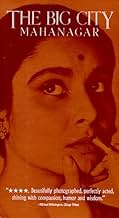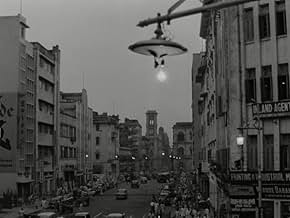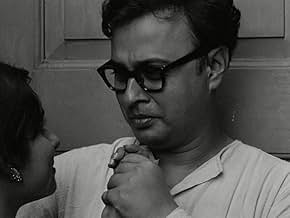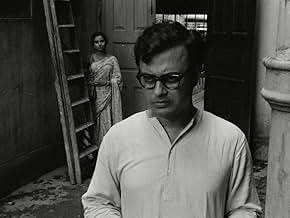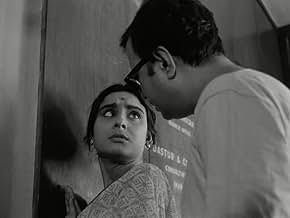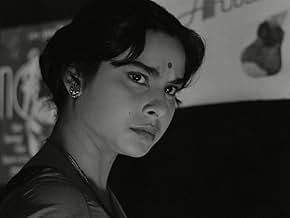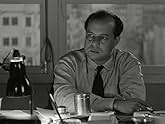La vie à la maison change quand une femme au foyer d'une famille traditionnelle de la classe moyenne à Calcutta obtient un emploi de vendeuse de porte-à-porte.La vie à la maison change quand une femme au foyer d'une famille traditionnelle de la classe moyenne à Calcutta obtient un emploi de vendeuse de porte-à-porte.La vie à la maison change quand une femme au foyer d'une famille traditionnelle de la classe moyenne à Calcutta obtient un emploi de vendeuse de porte-à-porte.
- Réalisation
- Scénario
- Casting principal
- Récompenses
- 4 victoires et 1 nomination au total
- Arati Mazumder
- (as Madhabi Mukherjee)
- Bani
- (as Jaya Bhaduri)
- Sarojini (Subrata's Mother)
- (as Shephalika Devi)
- Himangshu Mukherjee
- (as Haradhan Banerjee)
Avis à la une
After having finished watching Mahanagar, I felt that the lonely house wife I had seen earlier had achieved a sense of fulfillment..a sense of completion.The entire film is a microcosm of an typical urbane family of the 1960's Calcutta. The legendary city of Calcutta in the 1960's has been impressionistic-ally captured with all its charm as well as confusion.We can see some of the best well-scripted, realistic emotional sequences. An young Jayabhaduri too appears as the little sister of Mr. Mazumdar(The main character's husband). Madhabi Mukherjee again dons a intense character and proves her brilliance in acting.Now I have become impatient enough to watch Ray's Calcutta Trilogy and other films too.It is very difficult to get good prints of most of them.
Ray had based this film on Abataranika, a Bengali short story. All the actors have been handpicked-especially Anil Chatterjee and Haren Chatterjee-who played the role of Mr. Mazumdar and his father.The film was well-received at the 14th Berlin Festival and Ray won a Silver Bear for direction. Even though it was rejected at the Oscars, it received an All India merit certificate at the National awards that year.
Through this wonderful family drama, Ray tells us a story of the clash between modern and traditional values in a middle-class family struggling to make a living in the big city. Furthermore, Ray examines the 'urban' relationships as is reflected between the employer and employee, the husband and wife, the co-workers, the working mother and her child and so on. It is no surprise that Ray is THE most accomplished director of Indian cinema. This film, like pretty much everything else he did, only reminds us why.
The performances are top-notch. Again, this is no surprise as Ray manages to extract the best from his actors. Madhabi Mukherjee is breathtaking as we see her transform from a naive housewife, to a determined and excited employee to a strong courageous woman who stands up for her friend. Anil Chatterjee is excellent as the struggling husband who tries to make ends meet, silently accepts his wife's working but secretly resenting it. Vicky Redwood adds freshness with a strong presence and a likable performance. Haradhan Bannerjee is very good as the prejudiced but sympathetic boss. Jaya Bhadhuri delivers a very natural performance. The rest of the cast are all just as competent.
The ending isn't the traditional happy ending one witnesses in the numerous Indian films but it's one of optimism and hope that beautifully 'seals' the film. 'Mahanagar' is a fantastic example of the best of Indian cinema. A classic gem it is.
Satyajit Ray, in Mahanagar, made a movie where ( in terms of cinematography and story-telling) not a single frame is wasted in anyway. Every movement of the actors, every hint relates to something or the other, while the story-telling is still simple enough for the ordinary to follow the story. I would recommend this to anyone.
According to Roger Ebert, "the power of this extraordinary film seems to come in equal parts from the serene narrative style of director Satyajit Ray and the sensitive performances of the cast members." He described Mahanagar as "one of the most rewarding screen experiences of our time".
Ebert, as usual, is spot on. This film was a stunning surprise for me. With very few exceptions, I have found the "great" Indian films to be a let down, and the modern Bollywood film is just unbearable. This was, however, a treat and a great exploration of culture. The idea of women working and how that affects the esteem of their husbands is not unique to India, but there are certain themes -- the reaction of her father-in-law! -- that are unlike what you might see in an American film.
Le saviez-vous
- AnecdotesFifteen-year old Jaya Bhaduri's (later known as Jaya Bachchan) film debut and her only film with Satyajit Ray.
- GaffesWhen Priyogopal (Subrata's father) goes to visit his student Anupam Roychowdhury to ask for money he is shown having a conversation with Anupam in his office. When he is explaining his circumstance the camera shows him only sitting on a chair with his walking stick. In the very next scene when all the three characters are shown (third one being Anupam's wife ) the top of his walking stick has changed direction. The round bit on top was towards the right before and is turned to the left in the very next scene.
- Citations
Arati: You wouldn't recognize me on the job.
Subrata Mazumdar: What about at home? Would I recognize you at home?
Arati: You don't recognize me? Tell me honestly.
[Subrata shakes his head no]
Arati: Why not?
Subrata Mazumdar: It all feels a bit unfamiliar. It feels a bit...
Arati: What about this?
[points at her cheek]
Arati: You don't recognize my mole? I'm still the same housewife.
- ConnexionsReferenced in Creative Artists of India: Satyajit Ray (1964)
Meilleurs choix
- How long is The Big City?Alimenté par Alexa
Détails
- Date de sortie
- Pays d’origine
- Site officiel
- Langues
- Aussi connu sous le nom de
- The Big City
- Lieux de tournage
- RN Mukherjee Rd, Calcutta, Bengale occidental, Inde(closing shot: view of the city)
- Société de production
- Voir plus de crédits d'entreprise sur IMDbPro
- Durée2 heures 16 minutes
- Couleur
- Mixage
- Rapport de forme
- 1.37 : 1


